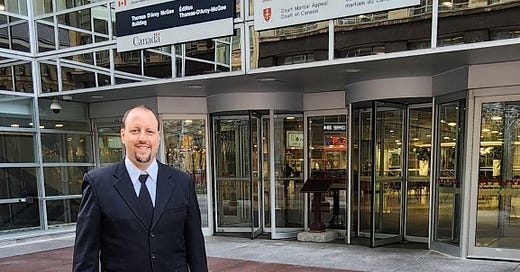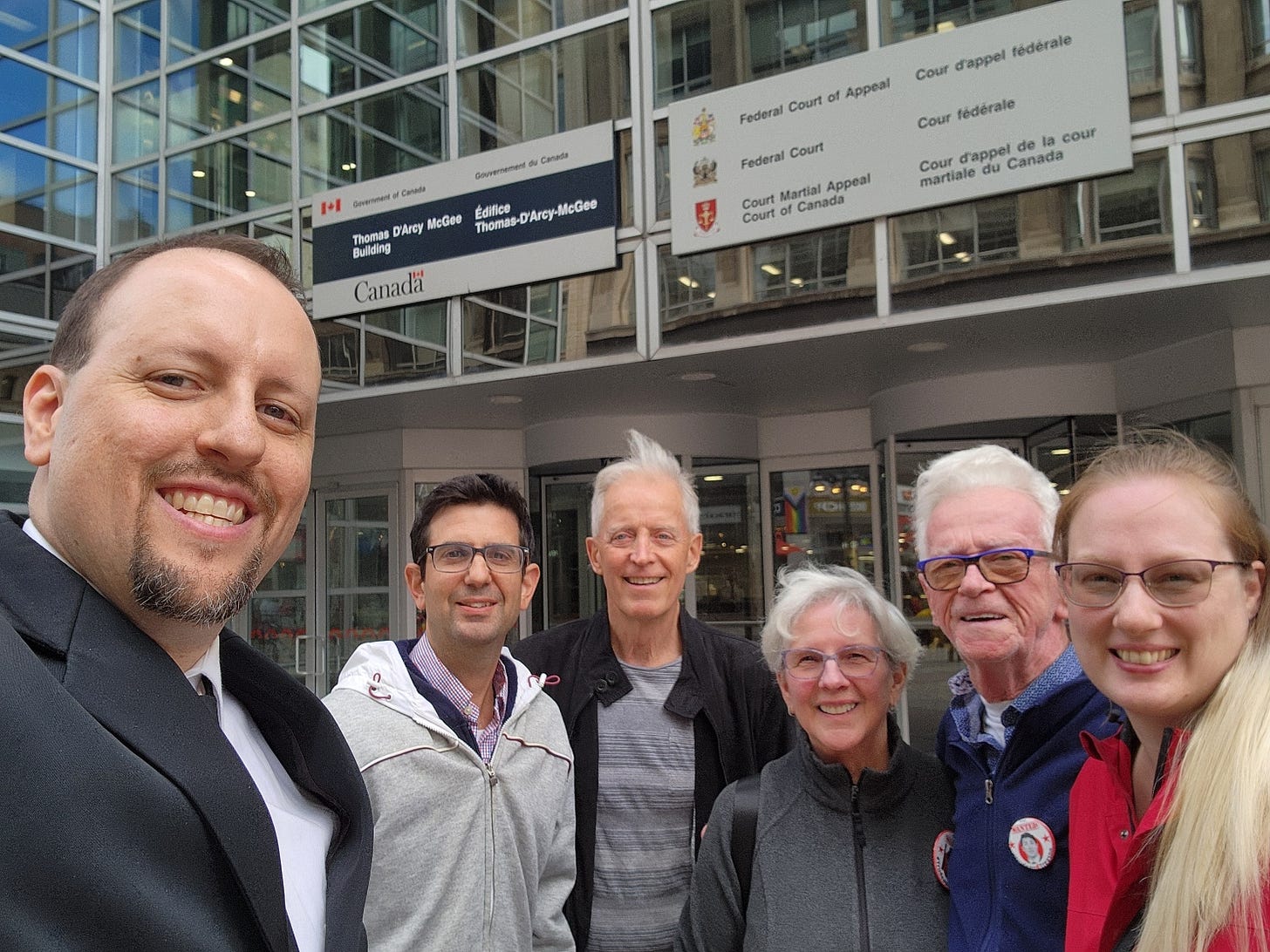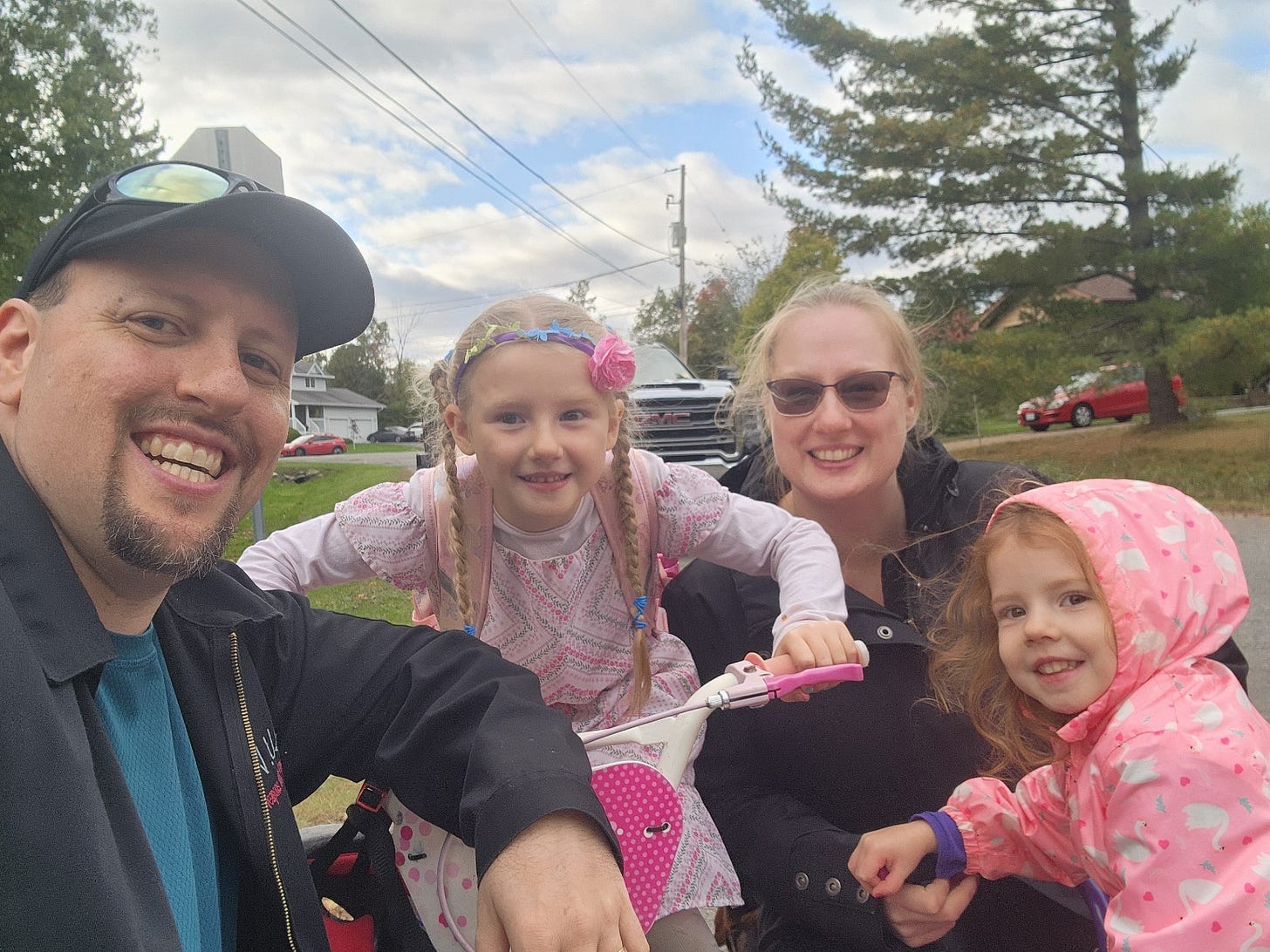Standing Up for Justice: My Day at the Federal Court of Appeal
Facing Legal Battles, Personal Loss, and Finding Hope in the Fight for Human Rights
Reflections on My Day in Court – Hearing on October 10, 2024
Before yesterday was a significant day in my legal journey and ongoing legal battle. I had the chance to present my case at the Federal Court of Appeal, and while it was an intense and emotional experience, I walked out feeling like a huge weight had been lifted off my shoulders.
Oh, and I should mention there were approximately 71 observers (9 in person if I recall and 62 virtually). The Registry Officer even noted it was the first time in three years they’d had children in the courtroom.
Before we begin, first, I want to thank my amazing family and friends; my wife Katie, my two daughters, my mother Gisèle, Réal, Oliver, and the lovely couple Jacques and Lise who came out to support the cause in person. I’d also like to thank everyone who tuned in virtually (including my father Marcel), and those of you supporting me directly or indirectly. You’re a huge inspiration, and I couldn’t have gotten this far without your encouragement and strength. So thank you all again!
Given the political divisiveness of our times, I want to give credit where it’s due. I’m sincerely grateful to the court staff, the judges, and the Attorney General’s solicitor for treating me with respect and dignity throughout the process and the hearing. It’s easy in situations like this, especially with opposing views in the courtroom, to take an adversarial stance and fall into an ‘us vs. them’ mindset.
But simply being heard, treated with fairness, and experiencing such professionalism and cordial civility really meant the world to me. This level of respect, even in the face of differing arguments, gives me hope in the Canadian legal system. It’s a step closer to justice and will make the process of healing and forgiveness that much easier moving forward.
Going into the hearing, despite the nerves and the intense preparation beforehand, I was still caught off guard by the sheer weight of the moment. As I began my opening, a flood of emotions hit me all at once, especially as I shared the deeply personal experience of my family's recent loss. With tears creeping up in my eyes, I explained how navigating these complex legal issues required a tremendous amount of time and effort, which had taken a toll on me and my family.
Referencing the heartfelt email from the Attorney General, who offered her sincere condolences and the option to reschedule, brought a sense of human connection to the courtroom that I didn’t expect. I had thanked her for treating me with dignity, but ultimately, I knew there was too much on the line to postpone as it would have weighed heavily on my mind.
Still, in that moment, standing before the court, sleep-deprived, mentally exhausted, and emotionally raw, I felt the full impact of everything I’d been carrying. As I spoke, I couldn’t help but reflect on the discrimination I’d experienced and wondered why I hadn’t been treated with the same level of respect and dignity back then. I tried to keep my composure, but the pressure was rapidly building beyond my control. I felt my body trembling, slipping into a state of shock, my legs weak beneath me, and the weight of both the legal stakes and personal pain hit me like a flood of emotions I couldn’t hold back.
Clearly in crisis and feeling like an emotional wreck, I asked the court if I could sit, and they graciously allowed it, making me feel dignified as they accommodated me when they could easily have said no. Just then, it became even harder for me to keep it together. These small gestures of compassion and care were breaking through the internal narrative I had been caught up in; one where it feels like there is constant conflict, fighting against a cold, corrupt machine that doesn't care about anyone, let alone my own situation.
For so long, it seems as though many of those involved within the establishment are distant and indifferent monsters; faceless entities with no regard for the real human impact of their actions. But now, with these unexpected signs of kindness and empathy, those harsh perceptions were gradually fading, revealing the individuals before me as human beings too, showing genuine compassion.
I was already struggling to speak through the emotions, and as my teary eyes intensified, my vision became increasingly blurry, making it even more difficult to read my opening statement. The judge, showing compassion and empathy once again, invited me to take my time, reassuring me that it was okay to pause and gather myself while the court staff discreetly handed me a box of tissues.
These acts of kindness started to shift my perspective, reminding me that the individuals in front of me were not the ones who had caused me harm, but rather neutral, objective parties willing to truly listen to me. Despite all the emotions, in that moment I felt respected and treated with dignity, which meant more than I can express.
In this appeal, I argued that the Federal Court made significant legal errors in dismissing my complaint. First, they applied the wrong standard of review. The Federal Court used the "reasonableness" standard when it should have been "correctness," standard, especially on key questions of law like the interpretation of "genetic characteristics" under the Canadian Human Rights Act. Meaning the Federal Court should have focused on whether the decision was actually right, not just whether the process used to make it was reasonable.
This matters because the definition of 'genetic characteristics' goes beyond health-related genetic tests. I argued that it should extend protections to include personal health information, like vaccination status, particularly because mRNA vaccines operate at the genetic level by introducing genetic material into the body, which could be considered a form of genetic alteration. By interpreting 'genetic characteristics' too narrowly, the court missed the broader intent of the law to protect personal health information, leaving many of us vulnerable to discrimination.
Second, some really important evidence was overlooked, like my affidavit and the appendices, which the Canadian Human Rights Commission left out. These documents backed up my claims of discrimination and showed that I was following my employer’s policies in good faith. Without this evidence, the full story wasn’t properly considered, and a big part of the discrimination I went through was missed. It was a serious mistake that needed to be addressed.
After my Federal Court hearing last year, the Social Security Tribunal gave their decision and confirmed that I hadn’t done anything wrong; there was no misconduct on my part. This was a huge deal because it proved that I followed the policy and wasn’t let go for any valid reason related to my job performance. Bringing up the SST decision in this appeal was crucial because it showed that an independent tribunal had already agreed that I acted fairly. It supported my argument that I was treated unfairly, and that the pressure I faced to disclose personal health information was both unjust and discriminatory.
Third, the court completely misunderstood my argument about partial or perceived disability by echoing the flawed reasoning of the Human Rights Officer and the Commission. At no point did I say I had a disability that kept me from taking the vaccine. What I actually argued was that my employer’s policy treated anyone unwilling to disclose their vaccination status as a potential health hazard, which discriminated against me based on perceived disability. But instead, the court assumed I was unvaccinated and dismissed this argument because they were stuck on a narrow definition of disability.
Finally, the harassment I went through, where my employer demanded my personal health information repeatedly under the threat of losing my job, was a key part of my complaint.
One moment that stood out was when the judges asked specific questions of the Attorney General, zeroing in on points I had raised. She seemed completely caught off guard, like it wasn’t something she had expected or prepared for. It gave me hope that they were genuinely considering my arguments, especially regarding perceived discrimination. The fact that my voice was being heard, that my points were resonating, was reassuring.
I was also happy to finally put key evidence on record, including news articles and reports that showed the inherent bias against unvaccinated people during that time. The policy treated anyone unwilling to disclose their vaccination status as unvaccinated, leading to discriminatory treatment. Throughout the pandemic, societal bias toward unvaccinated individuals created unfair assumptions, and everyone was affected, including people like me who had been working from home for years, but suddenly found themselves subjected to coercive measures. It felt like a small victory just having that officially put on record, no matter the outcome.
Despite the technical glitches and the limited time, I believe I conveyed the essence of my argument. Analogies like the comparison of 2 x $5 bills to a $10 bill equals the same purchasing power helped me illustrate the distinction between genetic test results and vaccine disclosure, that the outcome of asking for vaccination status is the same as revealing a genetic test results, and I think the judges understood the broader points I was making.
Overall I’m grateful the judges allowed me to finish my thoughts, even giving me a little extra time, which felt like a relief. It was important to get everything out there, especially since this case isn’t just about me, it’s about how human rights are protected in our modern world. If we let this narrow interpretation stand, many more could face similar discrimination based on their private health information, whether it’s related to vaccination status or genetic testing.
As the hearing drew to a close, I felt a mix of exhaustion and relief. Looking back, there’s always room for improvement, but I know I gave it everything I had under these circumstances. Regardless of the outcome, I’m proud that I stood up for myself, my family, and others who’ve been treated unjustly. This fight isn’t over, but for the first time in a long while, I feel hope; hope that justice will prevail and that this journey, though difficult, will be worth it in the end.
While the result is still uncertain, I’m confident that I left everything on the table. This experience has taught me resilience, patience, and the importance of standing up for what’s right, even when the odds seem stacked against you.
I’m committed to seeing this through, and I’m deeply thankful for all the support I’ve received. I’ll continue to share updates and insights on www.AndreFightsBack.com as this journey unfolds.






